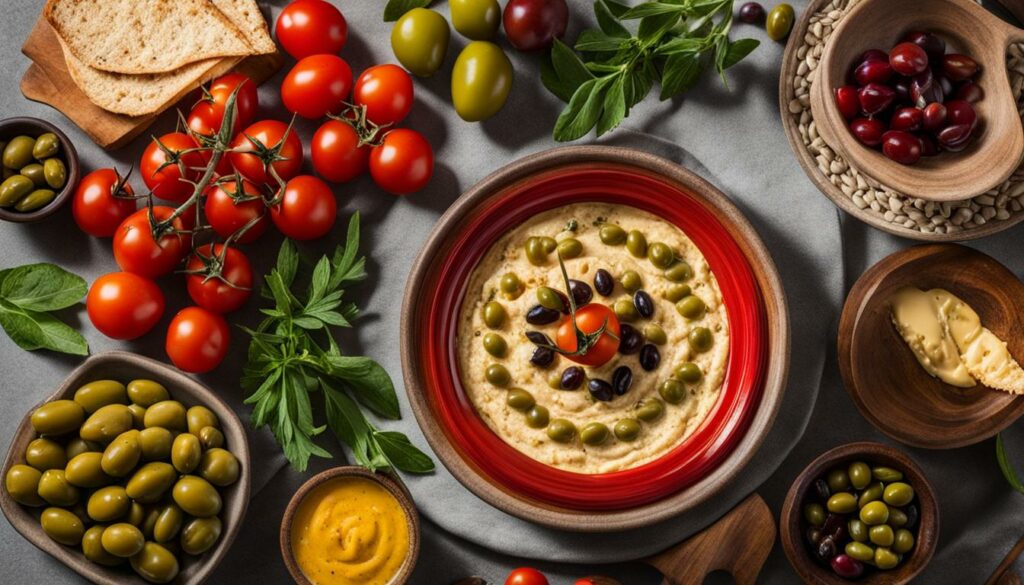Intermittent fasting (IF) is a popular eating pattern that involves alternating between periods of fasting and eating.
It has been shown to promote weight loss and has numerous health benefits, such as preventing and treating diseases like fatty liver disease, Type 2 diabetes, cardiovascular disease, obesity, Alzheimer’s disease, and certain types of cancers.
The Mediterranean diet, on the other hand, is a plant-based eating plan that emphasizes healthy foods like vegetables, fruits, beans, nuts, whole grains, extra virgin olive oil, and fish. It is rich in antioxidants, anti-inflammatory nutrients, and heart-healthy fats.
Combining intermittent fasting with the Mediterranean diet can provide synergistic health benefits, promote longevity, and help with weight loss.
Key Takeaways:
- Intermittent fasting (IF) involves alternating between periods of fasting and eating.
- The Mediterranean diet emphasizes healthy foods like vegetables, fruits, beans, nuts, whole grains, extra virgin olive oil, and fish.
- Combining IF with the Mediterranean diet can promote weight loss and provide numerous health benefits.
- IF can help prevent and treat diseases like fatty liver disease, Type 2 diabetes, cardiovascular disease, obesity, Alzheimer’s, and certain cancers.
- The Mediterranean diet is rich in antioxidants, anti-inflammatory nutrients, and heart-healthy fats.
The Science Behind Intermittent Fasting and the Mediterranean Diet
Intermittent fasting (IF) is an eating pattern that involves alternating between periods of fasting and eating. It has gained popularity due to its potential benefits such as weight loss, improved insulin sensitivity, and reduced inflammation.
On the other hand, the Mediterranean diet is a plant-based eating plan that emphasizes whole, unprocessed foods and healthy fats. It has been extensively studied for its positive effects on cardiovascular health, diabetes prevention, and cancer risk reduction.
Intermittent fasting works by reducing overall calorie intake, leading to weight loss. It can also improve insulin sensitivity, which is crucial for preventing and managing type 2 diabetes. Additionally, intermittent fasting has been found to reduce inflammation in the body, which is a key factor in many chronic diseases.
The Mediterranean diet, with its focus on fruits, vegetables, whole grains, and healthy fats like olive oil and nuts, provides a range of nutrients and antioxidants that support heart health and lower the risk of stroke. It also promotes weight loss due to its emphasis on nutrient-dense, low-calorie foods.
“Both intermittent fasting and the Mediterranean diet offer unique health benefits and complement each other in powerful ways.”
When combined, intermittent fasting and the Mediterranean diet can enhance these individual benefits and provide a synergistic effect on overall health. Research suggests that this combination can lead to improved weight loss, better cardiovascular health, reduced inflammation, and enhanced cognitive function.
The Mediterranean diet’s emphasis on nutrient-dense foods provides essential nutrients, antioxidants, and healthy fats, while intermittent fasting helps control calorie intake and promotes cellular repair.
This combination can lead to a range of health benefits, including weight management, reduced risk of chronic diseases, and increased longevity.
Benefits of Intermittent Fasting and the Mediterranean Diet:
- Promotes weight loss
- Improves insulin sensitivity
- Reduces inflammation
- Lowers the risk of type 2 diabetes
- Supports cardiovascular health
- Enhances cognitive function
- Provides essential nutrients and antioxidants
- Promotes longevity
The powerful combination of intermittent fasting and the Mediterranean diet offers a holistic approach to health and well-being. By incorporating these dietary strategies into your lifestyle, you can take advantage of their individual benefits and achieve optimal health for long-term wellness.

| Intermittent Fasting | Mediterranean Diet |
|---|---|
| Reduces overall calorie intake | Emphasizes whole, unprocessed foods |
| Promotes weight loss | Provides healthy fats like olive oil and nuts |
| Improves insulin sensitivity | Reduces the risk of heart disease and stroke |
| Lowers the risk of type 2 diabetes | Supports cognitive function |
| Reduces inflammation | Provides essential nutrients and antioxidants |
Combining Intermittent Fasting and the Mediterranean Diet
When it comes to combining intermittent fasting and the Mediterranean diet, there are several tips to keep in mind for a successful and effective approach. By focusing on consuming nutrient-dense, whole foods during the eating window, you can maximize the benefits of these two approaches.
Here are some key tips for combining the mediterranean diet and intermittent fasting:
- Choose your fats wisely: Extra virgin olive oil should be the main source of fat in your diet. Its rich antioxidant and anti-inflammatory properties contribute to the health benefits of the Mediterranean diet.
- Prioritize plant protein and seafood: When it comes to protein choices, opt for plant-based proteins like legumes, nuts, and seeds, as well as seafood. These options are leaner and align with the Mediterranean diet’s emphasis on plant-based, sustainable eating.
- Load up on whole grains, fruits, and vegetables: Make sure to include a variety of whole grains, fruits, and vegetables in your meals. These foods are packed with essential vitamins, minerals, and fiber, promoting optimal health and supporting satiety during fasting periods.
- Use salt-free seasonings: To enhance the flavor of your meals, opt for salt-free seasonings instead of traditional salt. This will help reduce sodium intake and lower the risk of high blood pressure and cardiovascular disease.
- Include calcium-rich foods: Calcium is crucial for strong bones and overall health. Incorporate calcium-rich foods such as dairy products, leafy greens, and fortified plant-based milk into your diet on a daily basis.
Adhering to a Mediterranean diet and intermittent fasting can be made easier with the help of meal delivery services like ModifyHealth. These services provide convenient and delicious options that align with the Mediterranean diet and intermittent fasting principles.
By combining intermittent fasting and the Mediterranean diet, you can achieve weight loss, improve cardiovascular health, and reap the many health benefits associated with these two approaches.
Eating Whole, Nutrient-Dense Foods
When following a combination of intermittent fasting and the Mediterranean diet, it’s crucial to focus on consuming whole, nutrient-dense foods. These foods are rich in vitamins, minerals, and antioxidants that support overall health and well-being.
Whole grains, fruits, and vegetables should make up the majority of your diet during the eating window. These foods provide essential nutrients, fiber, and antioxidants that help reduce inflammation, support heart health, and promote optimal digestion.
Protein choices should primarily come from plant sources, such as legumes, nuts, and seeds. Seafood is also an excellent option, as it is rich in heart-healthy omega-3 fatty acids.
Extra virgin olive oil should be used as the primary source of fat, as it is a staple of the Mediterranean diet and provides a wide range of health benefits. It contains monounsaturated fats, which can help reduce bad cholesterol levels and lower the risk of heart disease.
When seasoning your meals, opt for salt-free seasonings instead of traditional salt. Excessive salt intake can contribute to high blood pressure and cardiovascular disease, so using herbs, spices, and citrus juices can add flavor without the added sodium.
The Role of Meal Delivery Services
Adhering to a Mediterranean diet and intermittent fasting can be challenging, especially when juggling a busy lifestyle. That’s where meal delivery services like ModifyHealth can be incredibly helpful.
ModifyHealth offers meal delivery options tailored to the Mediterranean diet and intermittent fasting protocols. Their meals are prepared by professional chefs and designed to provide the right balance of nutrients while adhering to the principles of these eating approaches.
With meal delivery services, you can enjoy delicious and satisfying meals that align with your dietary goals. These services save time and effort by eliminating the need for meal planning, grocery shopping, and cooking, allowing you to focus on your health and well-being.
The Benefits of Combining Intermittent Fasting and the Mediterranean Diet
Combining intermittent fasting and the Mediterranean diet offers several benefits for overall health and well-being. By integrating these two approaches, individuals can experience weight loss, improved cardiovascular health, reduced inflammation, and increased longevity.
Research studies have shown that combining intermittent fasting and the Mediterranean diet can lead to greater weight loss and improved body fat percentage compared to following either approach alone. The synergistic effects of these two dietary patterns can enhance metabolic function and promote efficient fat burning.
Additionally, the combination of intermittent fasting and the Mediterranean diet has been associated with a reduced risk of heart disease. The Mediterranean diet, rich in antioxidant-rich fruits, vegetables, and healthy fats, can help lower cholesterol levels and improve heart health.
Intermittent fasting, on the other hand, supports cardiovascular health by reducing inflammation, improving insulin sensitivity, and optimizing blood pressure levels.
“The Mediterranean diet provides essential nutrients, antioxidants, and healthy fats, while intermittent fasting helps control calorie intake and promotes cellular repair.”
Another benefit of combining intermittent fasting and the Mediterranean diet is the potential to improve cognitive function.
The Mediterranean diet, with its emphasis on whole, unprocessed foods, is rich in nutrients and antioxidants that support brain health. Intermittent fasting enhances brain function by promoting the production of neurotrophic factors that promote the growth and survival of neurons.
The combination of intermittent fasting and the Mediterranean diet may also help lower the risk of developing type 2 diabetes. The Mediterranean diet, with its focus on low-glycemic index foods and healthy fats, helps regulate blood sugar levels.
Intermittent fasting improves insulin sensitivity and can assist in weight management, both of which are crucial factors in preventing and managing type 2 diabetes.
Furthermore, preliminary studies suggest that the combination of intermittent fasting and the Mediterranean diet may have potential cancer prevention benefits.
The Mediterranean diet’s abundance of plant-based foods and antioxidants may help protect against various types of cancers. Intermittent fasting, with its ability to reduce oxidative stress and inflammation, may also play a role in cancer prevention.
By combining intermittent fasting and the Mediterranean diet, individuals can take advantage of the unique benefits offered by each approach.
The Mediterranean diet provides essential nutrients, antioxidants, and healthy fats, while intermittent fasting helps control calorie intake, promotes cellular repair, and enhances metabolic function. This powerful combination can lead to improved overall health, increased longevity, and a greater sense of well-being.

Summary of Benefits:
| Benefits of Combining Intermittent Fasting and the Mediterranean Diet |
|---|
| Weight loss |
| Improved cardiovascular health |
| Reduced inflammation |
| Increased longevity |
| Lower risk of heart disease |
| Improved cognitive function |
| Lower risk of type 2 diabetes |
| Potential cancer prevention |
Conclusion
Combining intermittent fasting with the Mediterranean diet can have a profound impact on your health and longevity. These two approaches work hand in hand to provide a wide array of health benefits.
By focusing on consuming nutrient-dense, whole foods during your eating window and incorporating intermittent fasting into your daily routine, you can achieve weight loss, improve your cardiovascular health, reduce inflammation, and increase your overall lifespan.
The Mediterranean diet, with its emphasis on healthy fats, fruits, vegetables, and whole grains, provides essential nutrients and antioxidants that promote wellness. Intermittent fasting helps control calorie intake and triggers cellular repair processes, which can further enhance the benefits of the Mediterranean diet.
By embracing the Mediterranean diet and incorporating intermittent fasting, you can not only enjoy delicious and sustainable meals, but also create a healthy lifestyle that supports your long-term well-being.
Start by focusing on whole, unprocessed foods, and plan your fasting and eating periods strategically. With consistency and dedication, you can reap the rewards of this powerful combination and experience a healthier, happier life.
FAQ
What is intermittent fasting?
Intermittent fasting is an eating pattern that involves alternating between periods of fasting and eating.
What is the Mediterranean diet?
The Mediterranean diet is a plant-based eating plan that emphasizes healthy foods like vegetables, fruits, beans, nuts, whole grains, extra virgin olive oil, and fish.
What are the health benefits of combining intermittent fasting and the Mediterranean diet?
The combination of intermittent fasting and the Mediterranean diet can promote weight loss, improve cardiovascular health, reduce inflammation, and increase longevity.
How does intermittent fasting benefit health?
Intermittent fasting can help reduce overall calorie intake, promote weight loss, improve insulin sensitivity, lower the risk of type 2 diabetes, and reduce inflammation.
How does the Mediterranean diet benefit health?
The Mediterranean diet has been shown to reduce the risk of heart disease, stroke, type 2 diabetes, and certain cancers. It provides essential nutrients, antioxidants, and healthy fats.
What should I focus on when combining intermittent fasting and the Mediterranean diet?
When combining intermittent fasting and the Mediterranean diet, it is important to focus on consuming nutrient-dense, whole foods during the eating window.
What main fat source should I use when following a Mediterranean diet and intermittent fasting?
Extra virgin olive oil should be the main fat source when following a Mediterranean diet and intermittent fasting.
What should be the primary sources of protein when combining intermittent fasting and the Mediterranean diet?
Protein choices should primarily come from plant protein or seafood when combining intermittent fasting and the Mediterranean diet.
What should I include in my daily meals when following a Mediterranean diet and intermittent fasting?
Most of the food consumed should be whole grains, fruits, and vegetables. Salt-free seasonings should be used to flavor the food, and calcium-rich foods should be included daily.
Can meal delivery services help me adhere to a Mediterranean diet and intermittent fasting?
Yes, meal delivery services like ModifyHealth can make adhering to a Mediterranean diet and intermittent fasting easier.
What are the overall benefits of combining intermittent fasting and the Mediterranean diet?
Combining intermittent fasting and the Mediterranean diet can result in greater weight loss, improved cardiovascular health, reduced inflammation, and potential prevention of certain diseases such as type 2 diabetes and certain cancers.
What are the long-term health benefits of the Mediterranean diet and intermittent fasting?
Embracing the Mediterranean diet and incorporating intermittent fasting into your routine can support overall wellness, provide a delicious way of eating for long-term health, and potentially promote longevity.




